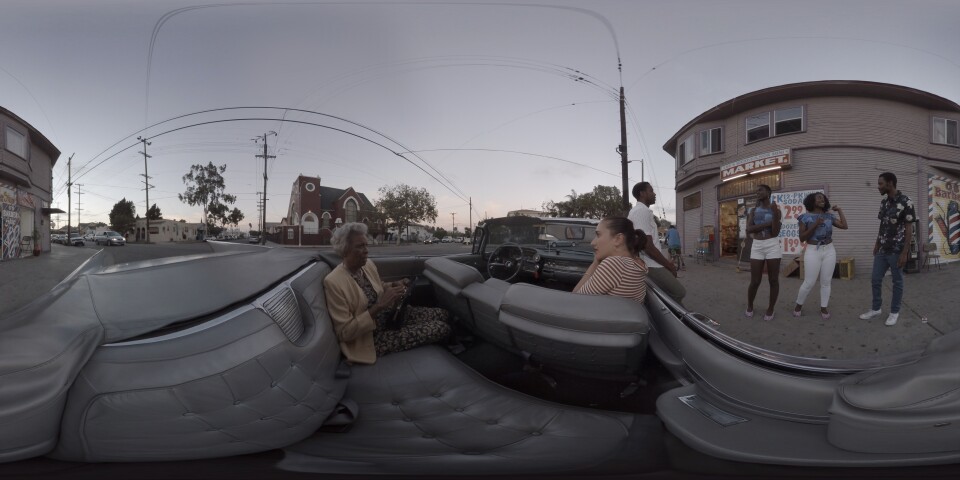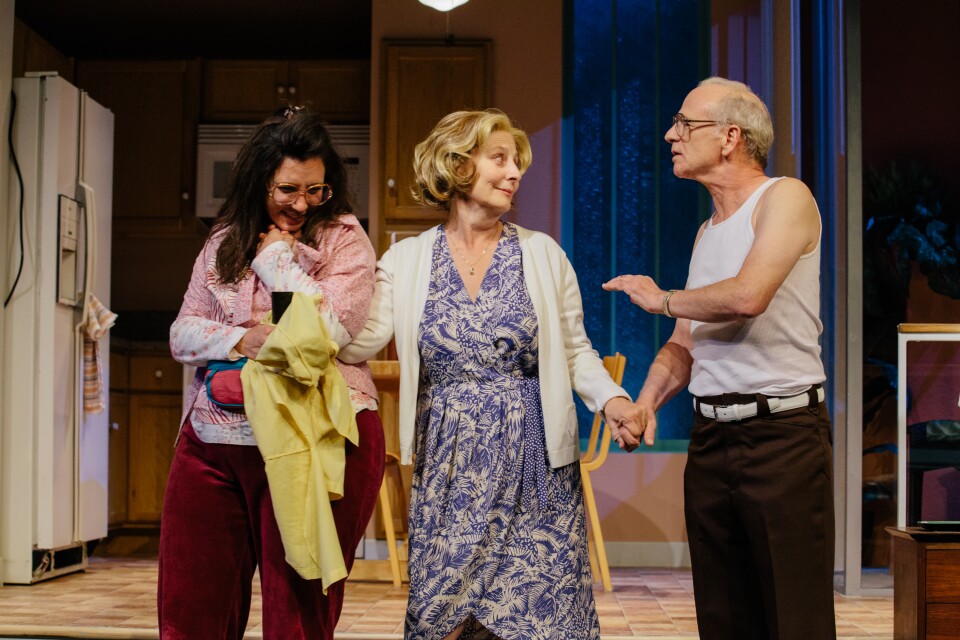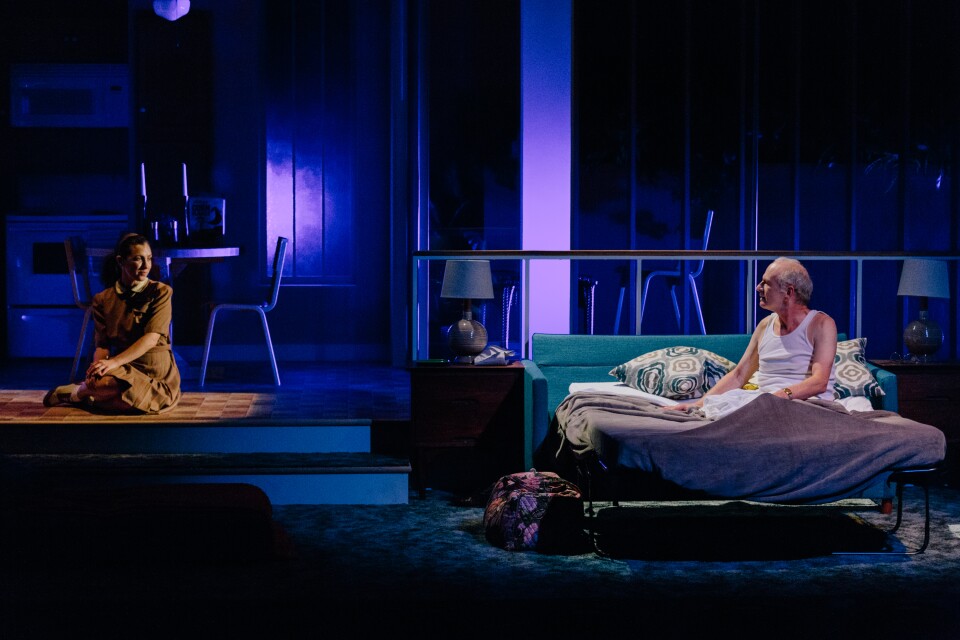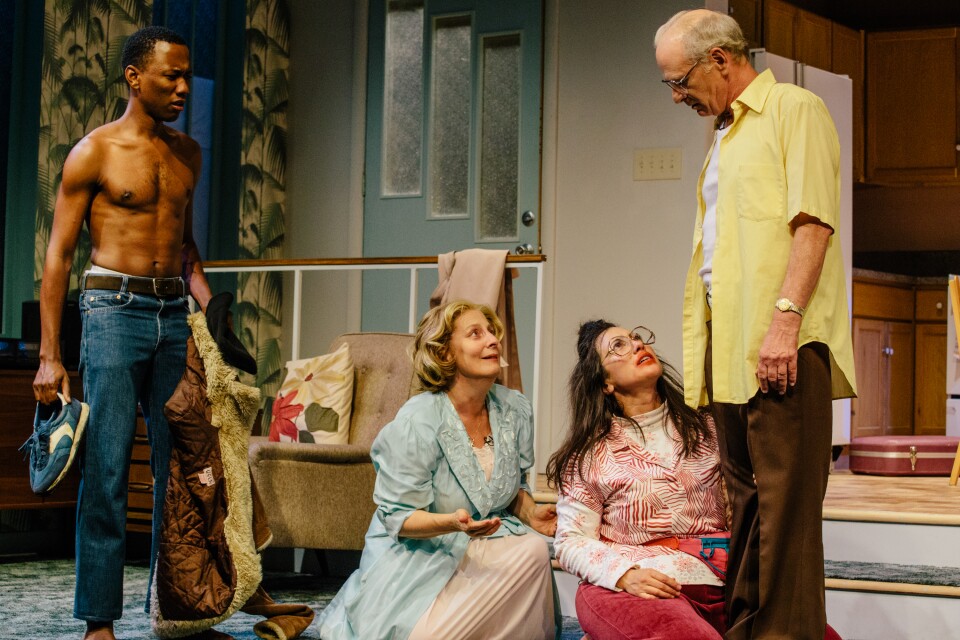The podcast network Gimlet Media's news shows include a radio drama with Oscar Isaac, Catherine Keener and David Schwimmer and a docuseries from the producers of HBO's The Jinx; Meet Janicza Bravo, a filmmaker who got her first TV break directing the most recent episode of "Atlanta"; Pulitzer Prize-winning playwright Donald Margulies talks about the origin story of his play "The Model Apartment" which is currently in production at The Geffen Playhouse.
Gimlet Media goes Hollywood to attract new listeners — and advertisers
Gimlet Media is the for-profit podcast network behind iTunes chart-topping shows like "StartUp" and "Reply All."
Earlier today, the company announced three new shows set to debut this fall. One of them, titled “Homecoming,” is Gimlet's first foray into fiction and it has an impressive cast. The "psychological thriller" stars Oscar Isaac, Catherine Keener, David Schwimmer, Amy Sedaris and David Cross.
Gimlet is also debuting a crime docuseries from the producers of HBO’s show “The Jinx.” The podcast is called "Crimetown" and it plans to explore crime and corruption one American city at a time, starting with Providence, R.I.
They will also debut a new historical podcast, "Undone," hosted by former Radiolab producer Pat Walters.
Gimlet's Caitlin Kenney, who oversees show development for the network, joined us to share more about these additions and the advertisers who are taking notice.
To hear the full conversation, click the play button at the top of the page.
Interview Highlights:
On the company's growth
If you look at the success of some of our earliest shows, Reply All and StartUp, which are doing tremendous numbers and you look at the advertisers those shows have attracted -- we've had Ford. Right now, we're doing a campaign with Virgin Atlantic. So I think it's really shown that there's good money to be made in this market, and if you make really compelling content, you can bring in an audience that can then attract advertisers that are trying to reach those people.
On branching out into fiction
Fiction is a space that's interested us for a long time. We think there's a lot of listener interest in these types of programs. If you look at he success of things like "Limetown" or "The Black Tapes Podcast," people want fiction content. For us, we also had a lot of outside contributors, a lot of writers pitching us stories, but we kind of felt like if we were going to enter a new space, a new arena for the company, we really wanted to do it ourselves. We really wanted to get our hands dirty and really be a part of shaping the content. Not just take something else that someone had made and then produce it in audio.
On the growing popularity of podcasts:
It was just announced this year that they're going to make a pilot about Gimlet on ABC News, which is a big deal. Network television being interested in a little podcasting company. They're going to make a show about our very first podcast called "StartUp." I think we just believe in really, really good storytelling and audio is kind of a unique medium. For a long time, for a lot of people, it was kind of a strange choice to get into audio because there weren't that many jobs. It was kind of a smaller media environment, but I think that as we see the shift to on demand happen, we're seeing that change. And people are just looking for all kinds of new and creative content that they can consume any time they want. And that's what we're trying to bring them here at Gimlet.
From VR to 'Atlanta': Director Janicza Bravo is on the rise
Every episode of the FX comedy “Atlanta,” was directed by either the creator-star Donald Glover or the director-producer Hiro Murai. That is, save for "Juneteenth" – the penultimate episode which aired last week – was helmed by guest director Janicza Bravo.
Through the last five years, Bravo has made a name for herself directing award-winning short films like "Gregory Go Boom" starring Michael Cera. But until "Atlanta" she'd never directed in television.
But it's easy to understand why Murai and Glover tapped Bravo to direct an episode of their show as her short films have a similar sensibility.
"I tend to do dark comedy. It's absurd and some of the show has this kind of absurdity. It lives in a very similar place that I live in tonally."
The “Atlanta” episode Bravo directed took place at an elaborate celebration for Juneteenth, a holiday commemorating the end of slavery. The comedy in the episode came in part from the over-the top nature of the party – Glover's character refers to the scene that has a quartet singing Negro Spirituals and signature drinks with names invoking plantations as "'Eyes Wide Shut' directed by Spike Lee."
Some of the humor also comes from the white husband of the woman hosting the party. The character, played by Rick Holmes, is an optometrist who's "obsessed with black history, obsessed with black culture," Bravo says. "He's one of these guys who knows more about black culture than someone who's say, black." He was the type of character that Bravo felt she'd met in real life and she wasn't alone.
"Donald [Glover] had also experienced this in his life and the writer Stefanie [Robinson]. We were sharing stories of this moment where we have been with a white person who asked things like, 'Have you been to Africa?' Made you feel bad about not having been to Africa."
In the last year, Bravo branched out in new mediums beyond TV. She made the short virtual reality film "Hard World for Small Things" with the company Wevr. But unlike her usual genre, this was a dramatic narrative about an incident of police brutality of an unarmed black man.
"It's a day in the life of this community in South Central. The protagonist is in this altercation that happens by mistake. It's not a real altercation. He literally bumps into a young cop and the cop hears this big crash and ends up shooting him."

The impetus for the VR film came from her family.
"My cousin had been asphyxiated by the cops in the summer of '99 in Brooklyn, and when I was approached to make a VR film, at the time I really wanted to be part of something political and I didn't know how to do it. This felt like my way. This was how I could throw my hat in that ring."
"Hard World for Small Things" played at the Sundance Film Festival and the Tribeca Film Festival and will also be at the AFI Festival in Los Angeles later this November. Bravo says that while virtual reality is appealing, that's not the direction she's going these days.
"I think the thing, what's sort of exciting, about VR is that there is something about it that feels a little bit like theater in that it's so raw that you can see everything about the image that isn't perfect. There's a lot of imperfection. I think in film you can arrive at close to perfection. Life looks and sounds better than it does.
"But I've only been doing films for five years and I'm not exhausted with that space yet. I'm having a good time in this reality. In this dimension. "
In fact, Janicza Bravo is currently in post-production on her first feature-length film. It's called "Lemon" and is based on a script she co-wrote with her husband, the actor-comedian Brett Gelman. And she's back to doing dark comedy. In the film, Gelman plays the lead of a cast populated with comedic actors including Michael Cera, Judy Greer, Nia Long and Megan Mullalley. She's hoping to get it into festivals next year.
To hear the full interview with Janicza Bravo, click the play button at the top of this page.
'The Model Apartment': Donald Margulies 1988 play about family trauma is still relevant
As a playwright, screenwriter and professor of theater studies at Yale, Margulies has had a prolific career. One of his earliest plays, “The Model Apartment,” premiered in 1988 in Los Angeles and is now returning to town.
Set in the 80s, the story focuses on two elderly Holocaust survivors, Max and Lola. They’ve hit retirement, and are looking to spend their golden years in Florida. But life in the Sunshine State turns dark very quickly, as the couple’s mentally ill daughter tracks them down and arrives at their retirement community without an invitation.
“The Model Apartment,” which is currently playing at the Geffen Theater in Westwood, examines not only the trauma of surviving an event as horrific as the Holocaust, but also how children of survivors can be profoundly shaped by their parents’ experiences. And that’s as relevant today — with genocide and civil wars around the globe — as it was when Margulies wrote his play several decades ago.
When I spoke with Margulies, he reflected on watching the "The Model Apartment" now with many more years of experience.
Interview Highlights:
On watching his own play almost thirty years later:
I view a play such as this — one that I wrote many years ago — as the work of a younger artist. And that the statement that I made at that particular time was what my intention was. I resist the temptation to revisit it in any way and just experience it as if I'm an audience member who is seeing it for the first time. There is a certain kind of pleasure in that because when I wrote it, I had limited success. I didn't have much of an audience. And there's a kind of lack of self consciousness that I think an artist sees in his/her work that was done before recognition struck. I think from that point forward, self consciousness begins to seep in an begins to cast a shadow over a kind of spontaneity that I think can never really be reclaimed.

On the inspiration for the characters in "The Model Apartment":
I am not a child of survivors but my oldest friend is. His parents were both survivors. I would spend Rosh Hashanah with them and Passover with them so I was very much immersed in the assimilated Holocaust survivor in America experience vicariously through my friend and his family. I think that the catalyst for "The Model Apartment" really came out of a conversation that I had with my old friend at a time in our lives when his parents were beginning to contemplate retirement. I remember being struck by the juxtaposition of imagining his parents as enduring persecution in Eastern Europe and here within the same lifetime now looking at condominium developments to acquire in Florida. And I just thought there was something kind of fabulous in that.

How his background in visual arts impacts his writing:
Very often a scene will come to me in terms of location or even the configuration of where the characters are standing and in what way they're standing. So I very often will have a visual reference to share with a director and his/her designers. In the case of "The Model Apartment," one of the inspirations for me was a photograph by Diane Arbus. One of the titles that it's known under is "A Jewish giant at home with his parents in the Bronx." It's this extraordinary photograph of this seven and a half foot tall — or maybe even more than that — nearly stooped with arthritis young man, leaning on a cane, towering over these little Jewish parents of his. I saw that photograph at the time that I was conceiving of "The Model Apartment" and that for me became the visualization of the metaphor of the play: of these two little people in the scheme of things confronted by this monstrous child of their own creation and trying to deal with the humanity of it — trying to deal with the enormity of it. So Diane Arbus became a great marker for the conception of the play.

On what he finds to be the most rewarding kind of audience response:
Sometimes people will recognize me as the pacing playwright in the lobby. But somebody will come up to me and say, are you the playwright? And I'll say, I am. And they say, I'm not Jewish. I have no relationship to the Holocaust, but I'm Syrian and this play resonated for me so extraordinarily given today's international migrant catastrophe. And I just think, that's the sort of experience I would hope the theater elicits generally, but certainly specifically for this play, that people put it in the context of what they're living now and not just simply viewing something that is depicting a time that is far away and removed from today's experience. I think there are still resonances within the very specific world of Holocaust survivors and their children.




